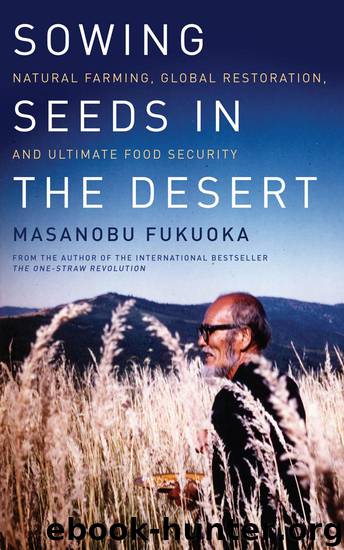Sowing Seeds in the Desert: Natural Farming, Global Restoration, and Ultimate Food Security by MASANOBU FUKUOKA

Author:MASANOBU FUKUOKA
Language: eng
Format: epub
ISBN: 9781603584197
The Tragedy of Africa
I heard of a plan by some people in a private, nongovernmental organization to promote modern agricultural methods in Somalia, so I joined up with them, flying to Africa, hoping to test my natural farming method for revegetating the desert. My first surprise came as I flew over Somalia and saw the large Juba River, the waters of which flow through the semi-desert year-round. The source of this river lies in the distant mountains of Ethiopia.
As the river nears the Indian Ocean, in some areas it disappears beneath the sand. At one time there must have been many such invisible rivers in Africa because, when viewed from the air, I could almost always see one or two pools of water in the midst of this semi-desert, which the local people call “the land of thorn trees.”
Also, when traveling over land, I saw large trees of unknown varieties. People told me that several hundred years ago these large trees formed a dense forest. Naturally, I tried to find out why the forest had disappeared.
From the accounts given to me by an Ethiopian elder and some Somali farmers, the main cause was the colonial agricultural policies brought in by Westerners. They introduced and exclusively grew commercial crops such as coffee, tea, sugarcane, cotton, tobacco, peanuts, and corn. Production of personal food crops was forbidden. This was done in the name of enriching the national economy.
When I went to apply for a visa from the Somalian government, I was flabbergasted when they told me that any kind of instruction that agitates the farmers and encourages them to become self-sufficient would not be welcome. If such activity went too far, they said, it would be considered treason.
Today, after two hundred years of colonial rule, seeds of the crops necessary for self-sufficiency have all but disappeared in Africa. If the seeds are gone, and the farmers are reduced to growing only cash crops, they descend from being farmers to simple laborers. They will have no chance of standing on their own feet again, and any possibility of agriculture that benefits nature will be cut off. Because the land cannot support the continuous cultivation of coffee and sugarcane, other seeds must be sown to restore the natural cycle, leading to healthy soil.
If the first cause of the African desert is errors in farming, the second is mistaken policies regarding the nomadic people. In the past, many African people were nomadic. From about twenty-three hundred years ago, they lived by roaming freely about the hills and plains with their camels and goats. Under colonial rule, however, this way of life was forbidden.
Originally there were various tribes, but no nation-states. As the Westerners conquered them and drew arbitrary boundaries to form countries, they also created large national parks, in the name of preserving the natural environment and animals. Common people were not allowed to enter the parks freely or graze animals there.
This was a deathblow to the nomadic people. On the surface, the old grazing patterns appeared to be random, but in fact they were bound by strict tribal rules.
Download
This site does not store any files on its server. We only index and link to content provided by other sites. Please contact the content providers to delete copyright contents if any and email us, we'll remove relevant links or contents immediately.
| Colder Climates | Desert |
| Temperate | Tropical |
Turbulence by E. J. Noyes(7057)
The Thirst by Nesbo Jo(5792)
Gerald's Game by Stephen King(3926)
Be in a Treehouse by Pete Nelson(3233)
Marijuana Grower's Handbook by Ed Rosenthal(3126)
The Sprouting Book by Ann Wigmore(3056)
The Red Files by Lee Winter(2923)
The Remains of the Day by Kazuo Ishiguro(2627)
Sharp Objects: A Novel by Gillian Flynn(2451)
Christian (The Protectors Book 1) by L. Ann Marie(2396)
Organic Mushroom Farming and Mycoremediation by Tradd Cotter(2313)
The Culinary Herbal by Susan Belsinger(2063)
Stone Building by Kevin Gardner(1998)
The Starter Garden Handbook by Alice Mary Alvrez(1930)
Lilac Girls by Martha Hall Kelly(1883)
The Unlikely Pilgrimage of Harold Fry by Rachel Joyce(1838)
The Lean Farm Guide to Growing Vegetables: More In-Depth Lean Techniques for Efficient Organic Production by Ben Hartman(1789)
Urban Farming by Thomas Fox(1752)
Backyard Woodland by Josh VanBrakle(1591)
